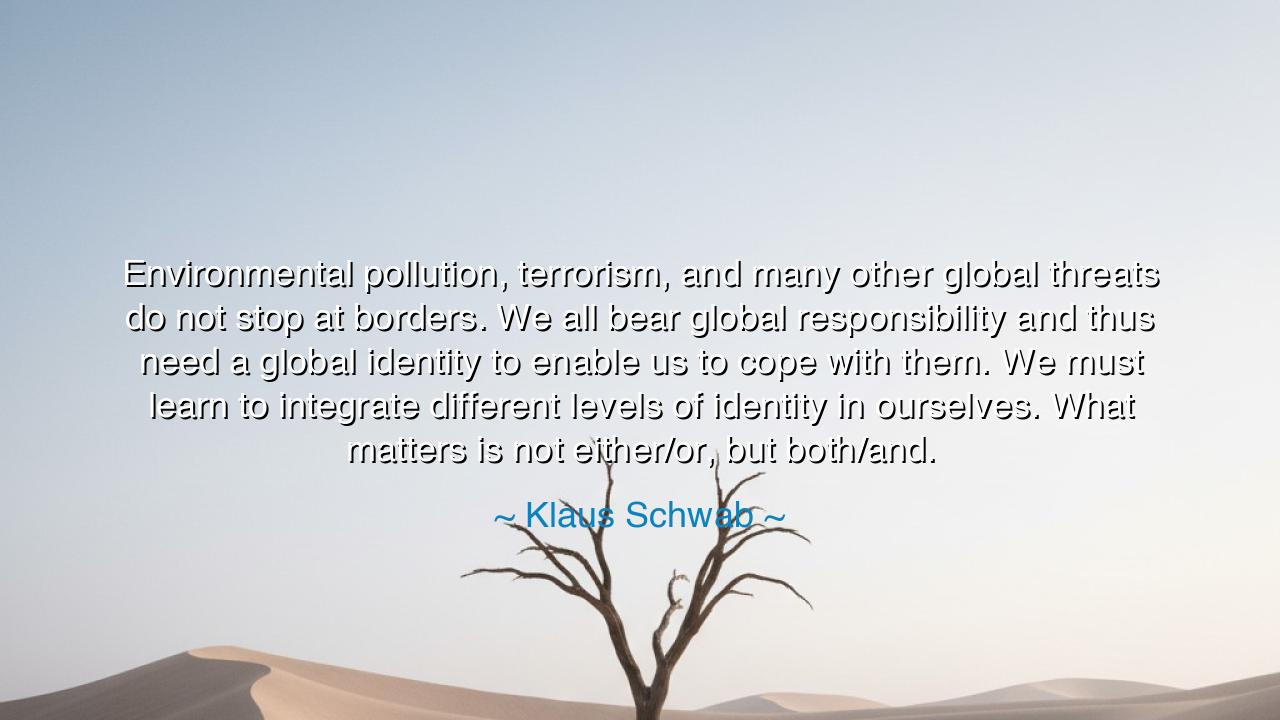
Environmental pollution, terrorism, and many other global threats
Environmental pollution, terrorism, and many other global threats do not stop at borders. We all bear global responsibility and thus need a global identity to enable us to cope with them. We must learn to integrate different levels of identity in ourselves. What matters is not either/or, but both/and.






In the words of Klaus Schwab, we are called to awaken from the illusion of separation: “Environmental pollution, terrorism, and many other global threats do not stop at borders. We all bear global responsibility and thus need a global identity to enable us to cope with them. We must learn to integrate different levels of identity in ourselves. What matters is not either/or, but both/and.” These words are both a warning and a revelation — a reminder that in this age of vast interconnection, no wall is high enough, no border strong enough, to shield one nation from the suffering of another. The rivers of the Earth flow through all lands; the winds that poison one sky touch every horizon. Thus, to heal the world, we must first expand the boundaries of who we are.
The ancients taught that the Earth was one living being, and humanity but one breath within her lungs. Yet in our time, the tribes of man have forgotten this unity, wrapping themselves in flags and divisions as though the soil beneath them did not share the same heartbeat. Global responsibility is not a modern invention — it is an ancient truth rediscovered. To act as if our actions end where our nation’s borders end is to deny the oneness of creation. Pollution, terrorism, and global threats are not enemies that visit from afar; they are the reflections of our collective neglect, the echoes of our disunity.
There is an ancient story from Greece that illustrates this truth. When the city of Athens fell into discord, its people turned upon one another, thinking their individual fates were separate. But as the philosopher Solon warned, “A house divided cannot stand when the storm comes.” And indeed, when invaders arrived, Athens — once mighty and proud — was broken not by the enemy’s sword, but by its own fragmentation. So it is with our world today. The storms we face — climate change, violence, disease, inequality — cannot be met with isolated defenses. We must remember that we are one household beneath one sky.
To have a global identity does not mean to abandon our roots, our cultures, or our nations. It means to weave them into something greater — to see that our smaller identities do not compete, but coexist. The ancient mystics taught that within every person are many selves — the self of the family, the self of the village, the self of the world. Integration is the harmony of these selves, the understanding that love for one’s homeland and love for humanity are not opposites but companions. The wise do not ask, “Am I loyal to my people or to the Earth?” They ask, “How can my loyalty to my people serve the Earth?”
Klaus Schwab’s teaching — “What matters is not either/or, but both/and” — is a challenge to the narrow mind. It is an invitation to maturity, to think not as children who divide the world into “us” and “them,” but as stewards who understand that survival and flourishing are shared destinies. The rivers that cross nations are not divided by maps; the air that sustains life does not respect boundaries. When we pollute the oceans, we poison all nations. When we lift one people from poverty, we strengthen all humankind. The enlightened path, then, is one of unity through diversity, of embracing the paradox that we are many and yet one.
Consider the Paris Climate Agreement, a moment in which nations of the Earth stood together to face a common foe — not another nation, but time itself. It was a fragile beginning, imperfect yet profound, born from the realization that only through collective action could we slow the rising tides. It showed that humanity is capable of global cooperation, if only it remembers that our survival depends not on dominance, but on harmony. History will remember such efforts not for their flaws, but for their faith in the possibility of togetherness.
Let this be the lesson for all generations: to think globally, act locally, and feel universally. To nurture the soil of one’s homeland while protecting the planet that holds it. To defend one’s people while honoring the dignity of all peoples. For identity is not a prison, but a bridge — and every bridge connects what was once divided. In our time, the hero is not the conqueror, but the unifier — the one who can see the world as one living tapestry and tend to every thread with care.
So, my children of the Earth, remember this truth: you are citizens not only of your country, but of the planet, and of the future itself. Let your heart be both village and world, both tribe and humanity. Do not think in terms of either/or, for the age of division is ending. Think in terms of both/and — for only together can we stand against the storms that know no borders, and only together can we build a dawn worthy of our shared home.






AAdministratorAdministrator
Welcome, honored guests. Please leave a comment, we will respond soon